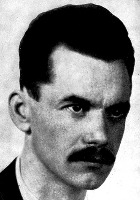Attila Jozsef
Attila Jozsef Poems
No shriek of mine, it is the earth that thunders.
Beware, beware, Satan has gone insane;
...
If you set out in this world,
better be born seven times.
Once, in a house on fire,
once, in a freezing flood,
...
I am alone on these glittering crags.
A sinuous breeze
floats delicious, the infant summer's
...
Slowly, musingly,
I am as one who comes to rest
by that sad, sandy, sodden shore
...
Kívül-belôl
leselkedó halál elöl
(mint lukba megriadt egérke)
...
On Mama now my thoughts have dawdled
all of a week. Clothes-basket cradled
creaked on her hip; she'd climb the stairway
...
What will become of him, whoever
has got no handle to his hoe,
upon whose whiskers crumbs don't quiver,
who dawdles, gloomy, thrawn, and slow;
...
Harminchat fokos lázban égek mindig
s te nem ápolsz, anyám.
Mint lenge, könnyû lány, ha odaintik,
...
And so I've found my native country,
that soil the gravedigger will frame,
where they who write the words above me
...
Adjonisten, Jézusunk, Jézusunk!
Három király mi vagyunk.
Lángos csillag állt felettünk,
gyalog jöttünk, mert siettünk,
...
Ime, hát megleltem hazámat,
a földet, ahol nevemet
hibátlanul irják fölébem,
ha eltemet, ki eltemet.
...
Karóval jöttél, nem virággal,
feleseltél a másvilággal,
aranyat igértél nagy zsákkal
anyádnak és most itt csücsülsz,
...
My eyes jump in and out, I'm mad again.
When I'm like this, don't hurt me. Hold me tight.
...
Magamban bíztam eleitõl fogva -
ha semmije sincs, nem is kerül sokba
ez az embernek. Semmiképp se többe,
mint az állatnak, mely elhull örökre.
...
Love me wildly, to distraction,
scare away my huge affliction,
in the cage of an abstraction,
...
Terrify me, my hidden God,
I need your wrath, your scourge, your thunder;
quick, come tumble out of the flood,
lest nothingness sweep us asunder.
...
It hurts so much
Death prowls behind
outside, inside into the hole
...
Attila Jozsef Biography
Attila József was one of the most important and well-known Hungarian poets of the 20th century. Attila József is the best known of the modern Hungarian poets internationally. His poems have been translated into many languages and he is taught in world literature classes around the globe. Hailed during the communist era of the 1950s as Hungary's great "proletarian poet", his life, personality, and works are now being re-evaluated with the current celebrations of the centenary of his birth. His first volume of poetry was A szépség koldusa (1922); at that time he was 17 and still in school. József studied privately for a year, and then entered the University of Szeged in 1924 to study Hungarian and French literature. With the help of a maecenas, Lajos Hatvany, he acquired a good education in Austria (1925) and Paris (1926–27), where he studied French literature and discovered the work of François Villon, the famous poet and thief from the 15th-century. In 1925 József published his second collection of poems, Nem én kiáltok. He was expelled from the university because of a revolutionary poem, Tiszta szívvel. With his manuscripts he traveled to Vienna, where he made a living by selling newspapers and cleaning dormitories, and then to Paris, where he studied at the Sorbonne. During this period he read Hegel and Karl Marx, whose call for revolution appealed to him. József's works were praised by such internationally known Hungarian researchers and critics as Béla Balázs and György Lukács. In 1927 several French magazines published József's poems. József's third collection of poems, Nincsen apám se anyám (1929), showed the influence of French surrealism and Hungarian poets Endre Ady, Gyula Juhász and Lajos Kassák. The next year József joined the illegal Communist Party of Hungary (KMP). Döntsd a tokét (1931) was confiscated by the public prosecutor and in 1931 József's essay Literature and Socialism (Irodalom és szocializmus) led to indictment. However, not long afterward, he left the Communist Party. Külvárosi éj, a mature collection of poems appeared in 1932. His most famous love poem, Óda, from 1933 took the reader for a journey around and inside the body of the beloved woman. József's last two books were Medvetánc (1934) and Nagyon fáj (1936). With these works he gained a wide critical attention. Ideologically he had started to advocate humane socialism and alliance with all democratic forces. Only a few are aware of the fact that it was Attila József who first formulated the ars poetica of transrealism in his 1937 poem Welcome to Thomas Mann. József's political essays were later included in Volume 3. of his Collected Works (1958).)
The Best Poem Of Attila Jozsef
No Shriek Of Mine
Nem én kiáltok
No shriek of mine, it is the earth that thunders.
Beware, beware, Satan has gone insane;
cling to the clean dim floors of the translucent springs,
melt yourself to the plate glass,
hide behind the diamond's glittering,
beneath the stones, the beetle's twittering,
O sink yourself within the smell of fresh-baked bread,
poor wretched one, poor wretch.
Ooze with the fresh showers into the rills of earth--
in vain you bathe your own face in your self,
it can be cleansed only in that of others.
Be the tiny blade upon the grass:
greater than the spindle of the whole world's mass.
O you machines, birds, tree-branches, constellations!
Our barren mother cries out for a child.
My friend, you dear, you most beloved friend,
whether it comes in horror or in grandeur,
it is no shriek of mine, but the earth's thunder.
